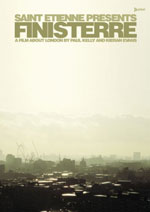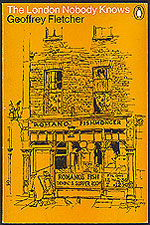Shop Around … pt 29

This is not really what I was intending to write. I was going to make more of that Live8 thing, and how it was supposed to be about the world’s most popular acts. And how if it was, I really must be out-of-step with the world. I was going to mess about with a bill of my own, full of the great unknowns, oddballs and Ed Balls, your Vic Godards, Mark Perrys, and whoever, all getting together at the end to join Dan Dan the TVPs Man to sing 'A Sense Of Belonging'. Although I was slightly uneasy about that as the last time I had sang along to 'A Sense Of Belonging' I had left the venue and walked smack into hordes of marauding Nazi skinheads. But that was 20 odd years ago.
20 years ago when Live Aid was on, I decided to disappear in London by going along to a Mod All-Dayer which was somewhere in Tufnell Park or Kentish Town. I can’t remember if I was being perverse, or if Makin’ Time or The Times were playing, making it all worthwhile. I do remember going there on the tube, and sitting near some blokes from The Gents (who were playing). They were debating Paul Weller, who was taking part in Live Aid (but interestingly not Live8), and how great his line about chasing dragons when you should be chasing dreams was. Funny what sticks in your mind. I took one look at the crowd and turned round and went shopping instead. I never did get to see The Times play live.
I remember shortly afterwards giving away my Times records, when I saw Ed Ball playing with Biff Bang Pow! in jogging bottoms. Things like that mattered then. I got a cheap copy of his Up Against It this week, from around that time, and all is forgiven. It’s the soundtrack to his adaptation of Joe Orton’s unrealised Beatles screenplay. Sadly Joe’s wit and writing has fallen off the radar, and not too many groups are sticking their necks out, and doing daft things like adapting old scripts. This Is London is another great lost Times record, which I hope I stumble across again sometime.

Ken contributes some kind words to the booklet that accompanies Finisterre. He writes that if you love London, you’ll love Finisterre. One of the main influences on Finisterre the film was Patrick Keiller’s London. I’ve only recently seen it now that it’s out on DVD (paired with the sequel Robinson In Space). And, yes, stylistically I can see similarities, in the way Keiller captures London, and explores dark shadows and empty green spaces. Where, however, Keiller’s tips his hat to Rimbaud and Baudelaire, Saint Etienne’s film references The Fall and Jasmine Minks.
The other touchstone for the Finisterre film makers was Geoffrey Fletcher. Interestingly again it’s a name I’ve not been overly familiar with, and I’ve neither seen nor read The London Nobody Knows. I did, via the internet, this week get a lovely cheap edition of his London At My Feet. And I was flicking through it on the train going up to Birmingham spookily enough.
The real stars of Finisterre are probably Mark Perry and Vic Godard, as they talk about getting the bus up the West End to go record shopping, or cycling back from the West End on bone shakers carried along on euphoria after seeing the Sex Pistols. These two great unknowns were strangely united as part of the Long Decline, where they would accompany the world’s most unlikely pop star Kenny Wisdom, putting together a right old racket. Odd folk for odd folk, to paraphrase Kenny.

And those two records have given me more joy and solace (and from that comes strength I promise oh stop it!) than anything else this week. Ken Livingstone (I'll tell you one thing Ken Livingstone’s a folk hero behave!) struck a chord with so many of us when he condemned the attacks on ordinary working class Londoners from all sorts of backgrounds. And maybe more than any pop outfit the Long Decline epitomise the absurdity and diversity and, yes, the perverse possibilities of London. Whether you know Kenny or not, it just shouldn’t work. But it does. Those two records are full of tremendous touching, bitingly bitter, agonisingly awkward, very funny, and very honest songs that you can’t help singing along to. It’s almost like an ultimate realisation of punk’s premise (promise) that anyone can do it. Just don’t tell Kenny I said so. He’ll think I’m going soft.
Ken Livingstone’s defiant sentiments were oddly echoed by those words of Geoffrey Fletcher that I read on a train heading out of London. Please excuse me if I repeat them here. “With eyes that see the romantic in the familiar, we wander in search of excitements and satisfactions in obscure quarters. London differs from most capitals in having been polyglot indeed everything-glot from the very beginning; hence its vitality.”
He goes on to state: “Surely the greatest tribute to London was never a written one: it was the way ‘evacuated’ people infiltrated back to town in the 1939-45 war, long before it was safe to do so, simply because for them there was no other place in which to live, and so they returned to ‘resume life’, as Dr Johnson put it.”
It’s a great week to treat yourself to a film about London. To listen to Kevin Rowland sing 'Reminisce (Part One)'. And to savour these further words of Geoffrey Fletcher from the late-‘70s: “A great city, an interplay of forces; contrasts and harmonies, flux and efflux, waning and waxing. An old man dies in a council flat; in the next block, a young wife brings forth her first born; kestrels are seen in the city; an odiferous down and out scrounges the price of a cuppa; a dark skinned girl bawls ‘Myna Doors’, as the evening rush begins on the Underground …..”
© 2005 John Carney